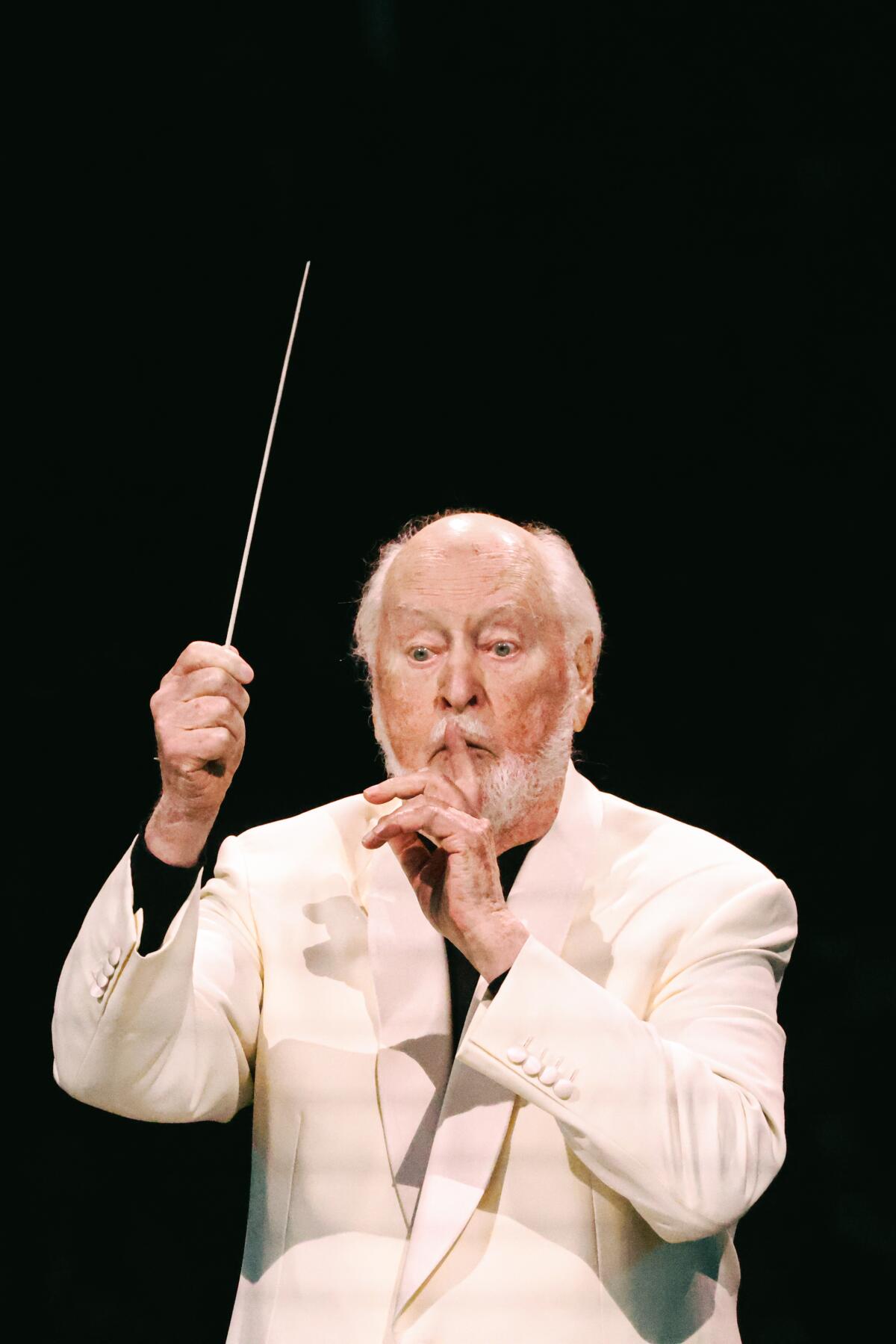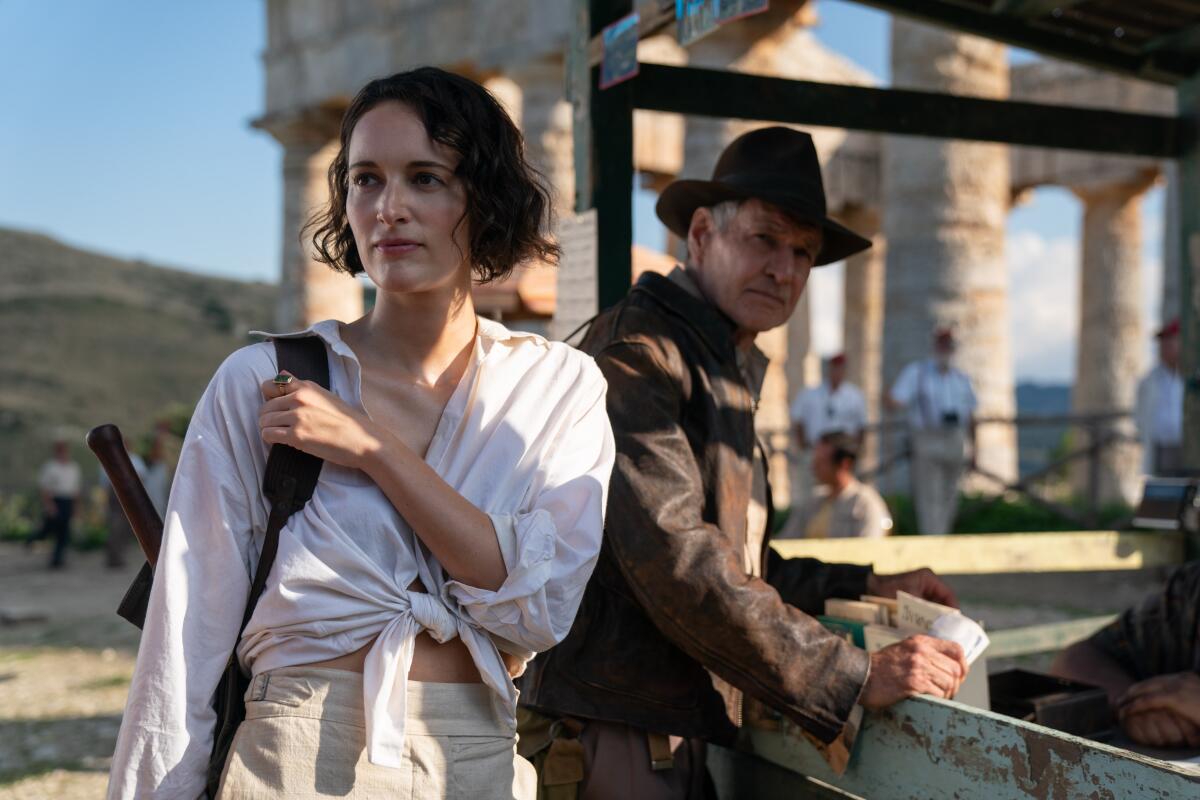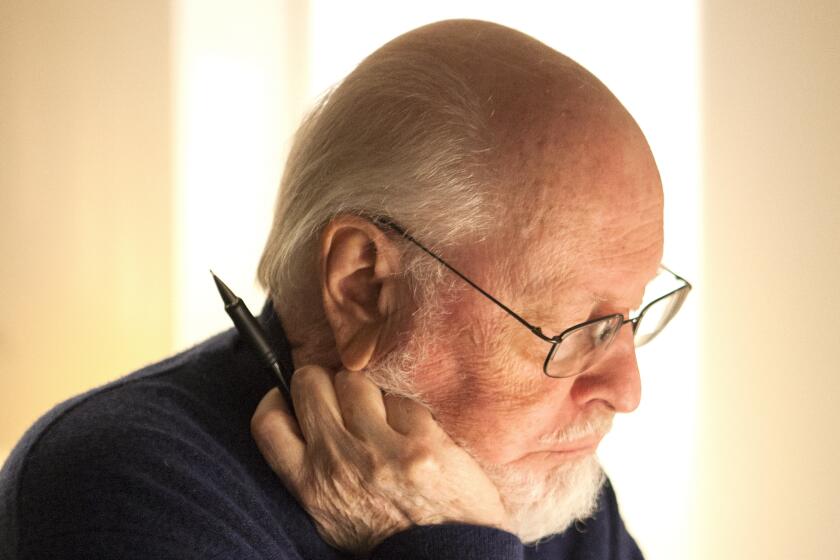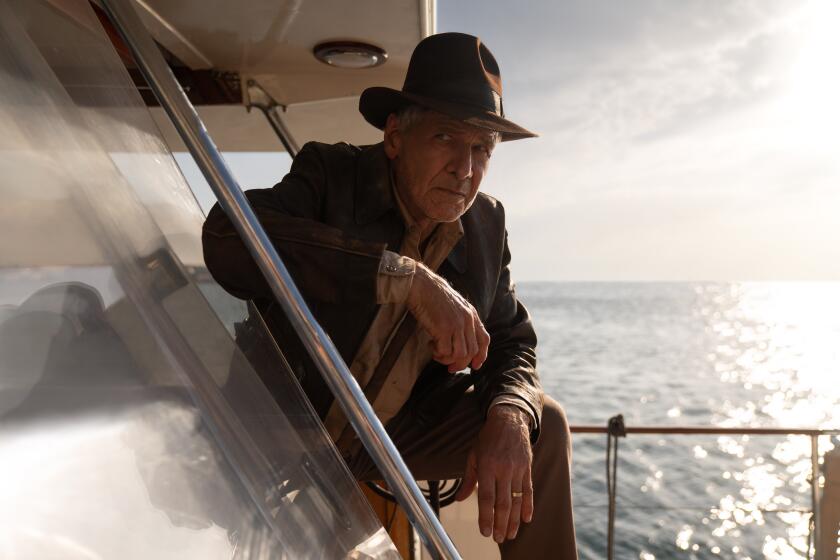How composer John Williams found that the ‘Indiana Jones’ sequel was his own destiny

- Share via
What does an old adventurer have to offer a modern world that seems to have moved on?
That’s the existential question posed to Indiana Jones, the beloved archaeologist immortalized by Harrison Ford across four decades, in “Indiana Jones and the Dial of Destiny.” Indy is creaky, retiring and alone when the fifth and latest chapter opens in 1969 — a man out of time.
It was also a question for John Williams, the venerable composer who gave Indy his infectious march beginning with “Raiders of the Lost Ark” in 1981. Williams was no less than Indy’s galloping tempo and his comic, whip-cracking action, his romantic stirrings and his heroic quest for every previous search for some ancient relic.
Now in his 10th decade, Williams had nothing left to prove and no obligation to score a new “Indiana Jones” film. For the first time, his forever-collaborator Steven Spielberg wasn’t even directing. So why get back in the saddle?
“Very frankly,” Williams says, “I thought to myself: Well, I really don’t want somebody else to do that. It was like when I was doing ‘Star Wars,’ you know. I thought: If I can possibly do it, I should try to do it.”
In other words: Just like Harrison Ford, no one else should wear that hat.
Scoring the director’s latest film, the composer tapped into the deep emotions of ‘The Fabelmans.’
Director James Mangold was overjoyed. He’s been a John Williams fanatic since he first heard the “Jaws” theme in 1975, and “there’s probably not a score [of his] I don’t own,” he says.
“John was making the sound of movies that inspired me to want to be a filmmaker,” Mangold, 59, says. “What John did with movie scores is not dissimilar to what Steven and George [Lucas] did with movie storylines — which was this kind of return to a classical, highly unself-consciously exuberant level of orchestral majesty and passion and expression, and unapologetically, proudly aware of its lineage.”
Still, there were practical concerns. Williams first thought he might not have the energy or time to compose two hours of the kind of elaborate, filigreed orchestral music that is his provenance. So he offered to write some character themes — much like he did for the “Star Wars” film “Solo” or the series “Obi-Wan Kenobi” — and let his longtime orchestrator, William Ross, extrapolate those melodies into an actual score.
He was immediately taken with Helena, Indy’s goddaughter, played with a light English swagger by Phoebe Waller-Bridge.
“I found her to be complex,” Williams says. “She was a gambler, and she was cosmopolitan, smoked, drank, was funny, witty. ... I said to myself: ‘What would I write for Lauren Bacall?’”
Williams took his new bag of character themes — which also included a sinister, low brass motif for the new Nazi heavy (played by Mads Mikkelsen), and a percussive, antique mystery theme for Archimedes and the Dial of Destiny — and recorded them with a full orchestra as “demos.”

When Mangold heard the sweepingly romantic, melodious theme Williams wrote for Helena, he had two immediate reactions: “One is: What a magnificent piece of music it was,” Mangold says. “And two is: I thought it was not right for the movie. My big note to him was, ‘It doesn’t feel naughty enough.’ I felt like: She’s trouble, and this theme is just so in love with her.”
“He never really paid attention to me,” Mangold laughs, “because I think he knew he had done something really wonderful.”
While that demo suite of Helena’s theme was indeed elegant and even infatuated, Williams proved his mastery at classical film scoring by adapting it into every conceivable mode — quiet mystery on celesta, playful wisecracking on muted trumpets — to map perfectly onto the character’s arc.
Far from searching for lost youth, Ford wanted to use ‘Dial of Destiny,’ which premiered Thursday at Cannes, to explore the realities of aging.
Initially, the climactic scene where Helena rides a motorcycle in the rain to follow a wounded Indy on an Italian airfield was scored by Ross using the Nazi motif. At the last minute, Williams took it back to the drawing board and scored it using Helena’s theme as the melodic engine.
“I thought it was some of the best work in the movie,” Mangold says. “He took her theme and let the brass play it and let it become a heroic romantic theme. Because, interestingly, that’s where she evolves. I find that the work John does inside scenes, and driving through action, is the one place where I think John may even undervalue his own genius.”
In the end, abetted by a prolonged postproduction schedule, Williams scored the entire picture himself — a symphonic master class in theme development and emotional choreography — one last rousing ride with the character whose musical identity he created.
The finale finds Indy transported back in history, an archaeologist’s dream. Asked where he would go if he could go back in time, Williams begins rattling off the many people he would want to talk to — Winston Churchill, Cicero, Bach. He says he would want to ask Beethoven how much of his style came from the counterpoint teacher, Johann Georg Albrechtsberger.
But then, sounding a lot like Indiana Jones, Williams admits: He already knows the answer.
More to Read
From the Oscars to the Emmys.
Get the Envelope newsletter for exclusive awards season coverage, behind-the-scenes stories from the Envelope podcast and columnist Glenn Whipp’s must-read analysis.
You may occasionally receive promotional content from the Los Angeles Times.












